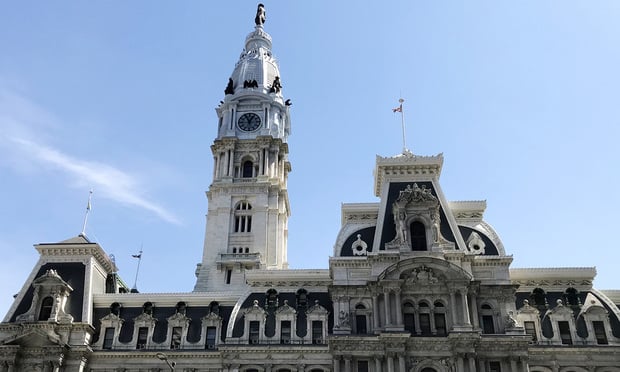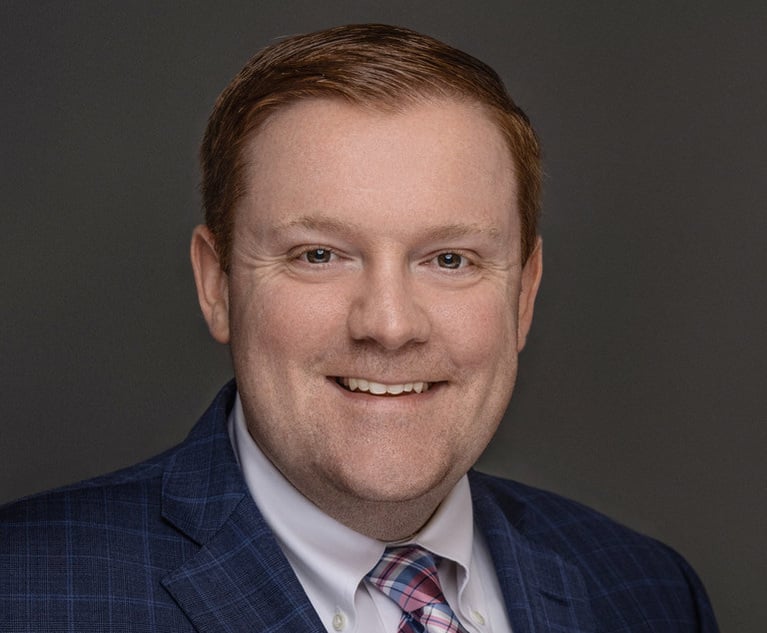Restarting Jury Trials: For Lawyers and Judges, the Closer You Look, the Harder It Gets
The consensus is Pennsylvania is at least months away from bringing jurors back. Earlier this month, several jurisdictions announced that all jury trials would be postponed until at least early September. Most lawyers, however, said they believe it is unlikely any civil trials will be held for the rest of the year.
May 26, 2020 at 02:24 PM
5 minute read
 Philadelphia City Hall building. Photo: Diego M. Radzinschi/ALM
Philadelphia City Hall building. Photo: Diego M. Radzinschi/ALM
Editor's note: This is the first in a two-part series examining when jury trials might begin to take place in Pennsylvania, and what they may look like once they do.
As attorneys begin reckoning with the impact of the COVID-19 pandemic on the legal profession, one question is on everyone's mind: When will courts be able to hold jury trials again?
In Pennsylvania it's a question court leaders have begun to grapple with in recent weeks, but it seems to grow more complicated the more closely it is examined.
"There are all these issues that the more you think about it and the more you talk about it, the more problems you start coming up with that maybe you hadn't anticipated beforehand," said Lackawanna County Court of Common Pleas Judge Terrence R. Nealon.
Nealon is leading a working group of judges from across Pennsylvania who have been tasked by the Administrative Office of Pennsylvania Courts to help develop guidance on the issues courts are likely to confront as they begin resuming jury trials.
The consensus is Pennsylvania is at least months away from bringing jurors back. Earlier this month, several jurisdictions announced that all jury trials would be postponed until at least early September. Most lawyers, however, said they believe it is unlikely any civil trials will be held for the rest of the year.
"September is probably an optimistic date. I don't see it," Kenneth Rothweiler of Eisenberg, Rothweiler, Winkler, Eisenberg & Jeck said. "The more likely outcome is not through 2020."
Dechert's Sozi Tulante agreed, and added that, even when juries are able to get back into the courthouses, things will look very different.
"The jury trial we imagine in our heads is not going to return until there is a vaccine, until people have some sense of comfort," he said.
Court leaders, however, are beginning to delve into the specifics of these issues, and, despite a constantly changing state of affairs, are working balance the constitutional right to a trial with the need for public safety.
Behind the Scenes
In Philadelphia, although jury trials are officially suspended until Sept. 8, the system is at the cusp of what President Judge Idee Fox refers to a "soft open," where operations that focused almost entirely on bare-bones emergency protocols are starting to loosen up. Some nonessential employees, Fox said, are beginning to come to the court facilities back on a staggered basis, which helps give the leadership a concrete sense of what it will take to bring people back to the building while maintaining social distancing requirements.
Each of the First Judicial District's buildings, Fox said, has its own committee working on the logistics for that building, and the court is planning to begin holding some criminal proceedings, like status conferences, guilty pleas and bail hearings, by Zoom beginning in June.
"We're really in a growing phase right now to try to expand what we can do," Fox said.
When it came to the decision to officially suspend jury trials another three months, Fox said the court arrived at the date with a lot of input from Administrative Judge Jacqueline Allen, who, Fox said, was working backward to estimate how long it might take to address all the known unknowns.
"We believe it is imperative to set a date, rather than leave that up in the open," Fox said, noting, however, that it too is tentative. "All of this depends on how the COVID-19 virus proceeds."
At a statewide level, the AOPC convened a working group of 12 judges from across the state, with Nealon as the chair. The group, which includes Judge Sheila Woods-Skipper in Philadelphia, Judge Christine Ward in Allegheny, Judge Carolyn Carluccio in Montgomery and Judge Richard Lewis in Dauphin, has been meeting weekly through Zoom with the members breaking into various committees to focus on the different challenges.
According to Nealon, the group has been working with the National Center for State Courts to learn about what other states have been doing, and has been in regular contact with a member of the executive branch's legal counsel, who is affiliated with the state Department of Health. The group, Nealon said, is planning to have a report to the state Supreme Court in June with recommendations.
In the U.S. District Court for the Eastern District of Pennsylvania, Judge Jeffrey Schmehl is heading the district's jury committee. Other committees, he said, have been formed to look at the needs for each building across the nine-county district, and currently they are awaiting more medical advice from the Administrative Office of U.S. Courts.
"Our country's premised on the right to a jury trial. How do we safely fairly and competently conduct one?" Schmehl said.
Regardless of what kind of case or what side of it attorneys are on, all agree that without jury trials, the entire system will have difficulty functioning.
"What gets cases settled is the threat of a jury trial. Jury trials facilitate settlements," Rothweiler, who focuses on civil litigation, said.
The same mentality goes for plea deals, so just getting cases firmly scheduled could resolve at least some of the backlog court systems now face.
In the meantime, attorneys are doing their best to keep moving their cases through discovery, and getting them as ready for trial as possible.
"I would say, universally both the plaintiffs bar and defense bar are frustrated," Rothweiler said. "We're all trial lawyers, we're used to moving cases into discovery and then to trial."
The second part of this series examines what jury trials may look like in the wake of the pandemic.
This content has been archived. It is available through our partners, LexisNexis® and Bloomberg Law.
To view this content, please continue to their sites.
Not a Lexis Subscriber?
Subscribe Now
Not a Bloomberg Law Subscriber?
Subscribe Now
NOT FOR REPRINT
© 2025 ALM Global, LLC, All Rights Reserved. Request academic re-use from www.copyright.com. All other uses, submit a request to [email protected]. For more information visit Asset & Logo Licensing.
You Might Like
View All
Visa Revocation and Removal: Can the New Administration Remove Foreign Nationals for Past Advocacy?
6 minute read

Feasting, Pledging, and Wagering, Philly Attorneys Prepare for Super Bowl
3 minute readLaw Firms Mentioned
Trending Stories
- 1Microsoft Becomes Latest Tech Company to Face Claims of Stealing Marketing Commissions From Influencers
- 2Coral Gables Attorney Busted for Stalking Lawyer
- 3Trump's DOJ Delays Releasing Jan. 6 FBI Agents List Under Consent Order
- 4Securities Report Says That 2024 Settlements Passed a Total of $5.2B
- 5'Intrusive' Parental Supervision Orders Are Illegal, NY Appeals Court Says
Who Got The Work
J. Brugh Lower of Gibbons has entered an appearance for industrial equipment supplier Devco Corporation in a pending trademark infringement lawsuit. The suit, accusing the defendant of selling knock-off Graco products, was filed Dec. 18 in New Jersey District Court by Rivkin Radler on behalf of Graco Inc. and Graco Minnesota. The case, assigned to U.S. District Judge Zahid N. Quraishi, is 3:24-cv-11294, Graco Inc. et al v. Devco Corporation.
Who Got The Work
Rebecca Maller-Stein and Kent A. Yalowitz of Arnold & Porter Kaye Scholer have entered their appearances for Hanaco Venture Capital and its executives, Lior Prosor and David Frankel, in a pending securities lawsuit. The action, filed on Dec. 24 in New York Southern District Court by Zell, Aron & Co. on behalf of Goldeneye Advisors, accuses the defendants of negligently and fraudulently managing the plaintiff's $1 million investment. The case, assigned to U.S. District Judge Vernon S. Broderick, is 1:24-cv-09918, Goldeneye Advisors, LLC v. Hanaco Venture Capital, Ltd. et al.
Who Got The Work
Attorneys from A&O Shearman has stepped in as defense counsel for Toronto-Dominion Bank and other defendants in a pending securities class action. The suit, filed Dec. 11 in New York Southern District Court by Bleichmar Fonti & Auld, accuses the defendants of concealing the bank's 'pervasive' deficiencies in regards to its compliance with the Bank Secrecy Act and the quality of its anti-money laundering controls. The case, assigned to U.S. District Judge Arun Subramanian, is 1:24-cv-09445, Gonzalez v. The Toronto-Dominion Bank et al.
Who Got The Work
Crown Castle International, a Pennsylvania company providing shared communications infrastructure, has turned to Luke D. Wolf of Gordon Rees Scully Mansukhani to fend off a pending breach-of-contract lawsuit. The court action, filed Nov. 25 in Michigan Eastern District Court by Hooper Hathaway PC on behalf of The Town Residences LLC, accuses Crown Castle of failing to transfer approximately $30,000 in utility payments from T-Mobile in breach of a roof-top lease and assignment agreement. The case, assigned to U.S. District Judge Susan K. Declercq, is 2:24-cv-13131, The Town Residences LLC v. T-Mobile US, Inc. et al.
Who Got The Work
Wilfred P. Coronato and Daniel M. Schwartz of McCarter & English have stepped in as defense counsel to Electrolux Home Products Inc. in a pending product liability lawsuit. The court action, filed Nov. 26 in New York Eastern District Court by Poulos Lopiccolo PC and Nagel Rice LLP on behalf of David Stern, alleges that the defendant's refrigerators’ drawers and shelving repeatedly break and fall apart within months after purchase. The case, assigned to U.S. District Judge Joan M. Azrack, is 2:24-cv-08204, Stern v. Electrolux Home Products, Inc.
Featured Firms
Law Offices of Gary Martin Hays & Associates, P.C.
(470) 294-1674
Law Offices of Mark E. Salomone
(857) 444-6468
Smith & Hassler
(713) 739-1250






